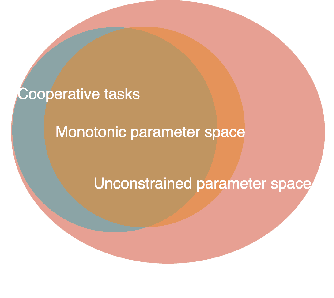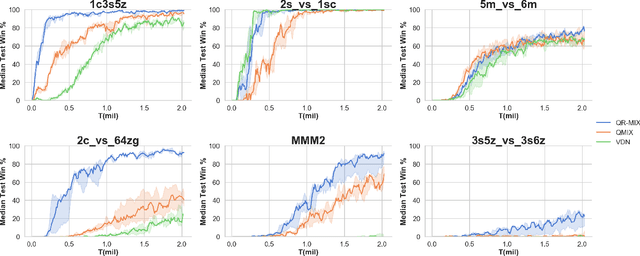Seth Austin Harding
RIIT: Rethinking the Importance of Implementation Tricks in Multi-Agent Reinforcement Learning
Mar 01, 2021



Abstract:In recent years, Multi-Agent Deep Reinforcement Learning (MADRL) has been successfully applied to various complex scenarios such as computer games and robot swarms. We investigate the impact of "implementation tricks" of state-of-the-art (SOTA) QMIX-based algorithms. Firstly, we find that such tricks, described as auxiliary details to the core algorithm, seemingly of secondary importance, have a major impact. Our finding demonstrates that, after minimal tuning, QMIX attains extraordinarily high win rates and achieves SOTA in the StarCraft Multi-Agent Challenge (SMAC). Furthermore, we find QMIX's monotonicity condition helps improve sample efficiency in some cooperative tasks, and we propose a new policy-based algorithm, called: RIIT, to prove the importance of the monotonicity condition. RIIT also achieves SOTA in policy-based algorithms. At last, we propose a hypothesis to explain the monotonicity condition. We open-sourced the code at \url{https://github.com/hijkzzz/pymarl2}.
QR-MIX: Distributional Value Function Factorisation for Cooperative Multi-Agent Reinforcement Learning
Sep 28, 2020



Abstract:In Cooperative Multi-Agent Reinforcement Learning (MARL) and under the setting of Centralized Training with Decentralized Execution (CTDE), agents observe and interact with their environment locally and independently. With local observation and random sampling, the randomness in rewards and observations leads to randomness in long-term returns. Existing methods such as Value Decomposition Network (VDN) and QMIX estimate the mean value of long-term returns while ignoring randomness. Our proposed model QR-MIX introduces quantile regression, modeling joint state-action values as a distribution, combining QMIX with Implicit Quantile Network (IQN). Besides, because the monotonicity in QMIX limits the expression of joint state-action value distribution and may lead to incorrect estimation results in nonmonotonic cases, we design a flexible loss function to replace the absolute weights found in QMIX. Our methods enhance the expressiveness of our mixing network and are more tolerant of randomness and nonmonotonicity. The experiments demonstrate that QR-MIX outperforms prior works in the StarCraft Multi-Agent Challenge (SMAC) environment.
 Add to Chrome
Add to Chrome Add to Firefox
Add to Firefox Add to Edge
Add to Edge